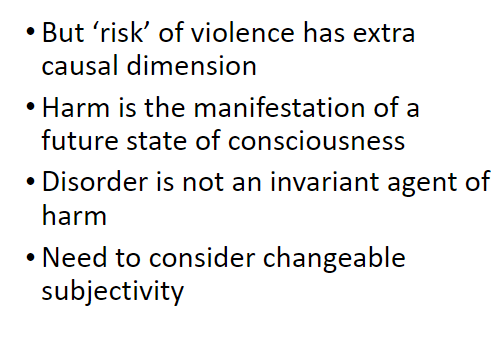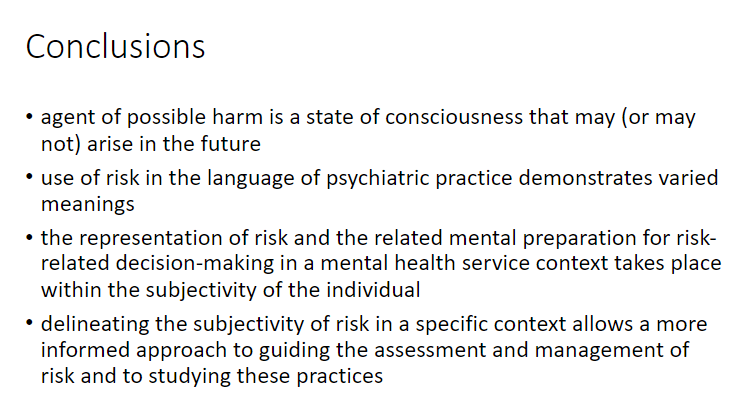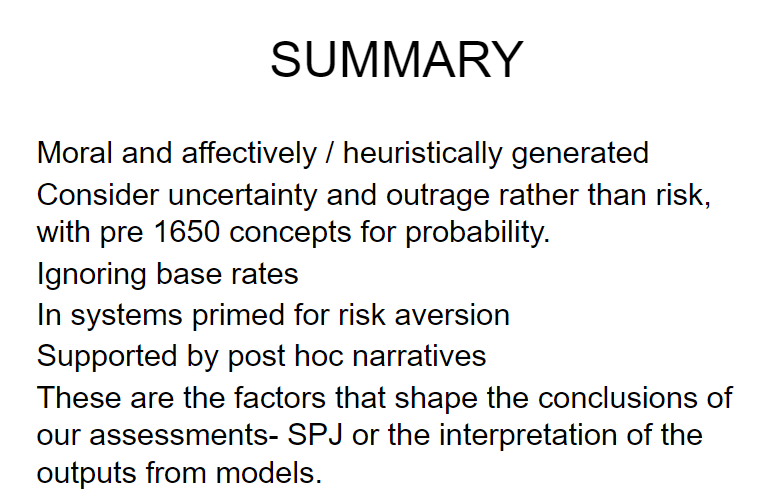
We're set for the second set of split sessions on Day 4 #RCPsychIC and in this thread we're covering 'Different views on violence risk assessments'. First up is @seenafazel looking at myths and evidence abt risk assessment.
@seenafazel The first myth to be debunked: assessment on its own improves outcomes - not true, it needs to be linked to something says @seenafazel #RCPsychIC
@seenafazel Another myth: Risk assessment of violence needs to be focused around needs - no, predictors just need to be good at predicting, says @seenafazel #RCPsychIC
@seenafazel Myth: Violence risk assessment tools confirm systemic biases - they can says @seenafazel but clinicians also biased, in terms of optimism eg. Another myth - suicide + violence are too unpredictable to forecast accurately. Not true - we can predict quite well #RCPsychIC
@seenafazel Risk assessment scores are based on groups and too uncertain to use with individuals - not true, if you have a large enough sample you can narrow the uncertainty, and statisticians have written about this says @seenafazel #rcpsychic
@seenafazel The last myth abt violence risk assessment tools- that machine learning is better than traditional methods such as regression which give you a risk score. No, there's no evidence to prove this says @seenafazel #RCPsychIC
@seenafazel These are the characteristics of the violence risk assessment tools we should develop and be using in the next 10 years says @seenafazel #RCPsychIC 

@seenafazel Our next speaker is Prof Taj Nathan @tajnathan who will demonstrate the concept of risk isn't as simple as it appears. His talk is called 'Risk of harm to others: subjectivity and meaning of risk in mental health practice' #RCPsychIC
@seenafazel @tajnathan In the psychiatric scenario the disorder associates with a state of consciousness in the future (future changes inc to environment might affect behaviour) - concept of risk is different to an inflamed appendix being a risk of appendicitis. @tajnathan #RCPsychIC 

@seenafazel @tajnathan Definitions can be problematic says @tajnathan as he discusses how risk is defined in the context of risk assessment of violence. #RCPsychIC 

@seenafazel @tajnathan We need an agreed meaning of risk or at least to understand its components. If our understanding isn't compatible with its notions we haven't sufficiently thought through the concept says @tajnathan #RCPsychIC 

@seenafazel @tajnathan The conclusions of @tajnathan with regard to the concept of risk in the context of risk assessment of violence. #rcpsychic 

@seenafazel @tajnathan Our final speaker in this session about risk assessment of violence is Dr Ed Silva whose talk is called 'Violence Risk Assessment: moral psychology + the history of risk and uncertainty' #RCPsychIC
@seenafazel @tajnathan It is important to recognise ethical disagreements are inevitable and organisations find these situations v difficult. A lot of our moral decision making is driven by fear says Dr Silva. 

@seenafazel @tajnathan We don't really know what we mean by the word risk (in context of assessing risk of violence), and we work in systems which will punish us severely for being wrong - which shapes the outputs of our SPJs says Dr Silva. #RCPsychIC 

• • •
Missing some Tweet in this thread? You can try to
force a refresh













